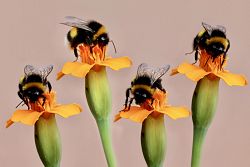

Bees' Needs Week (14-20 July) starts today, which is an annual event run by the Department for Environment, Food and Rural Affairs (DEFRA), working with a range of organisations including conservation groups, businesses and charities.
The aim of the week is:
Prioritise pollinators
Pollinators are a priority for the UK government and a key part of delivering the Environmental Improvement Plan. We know that bees, and other pollinating insects, are an essential part of our environment and play a crucial role in food production. However they're under threat because of pesticides, 'concrete gardens' and a changing climate.
DEFRA works in partnership with many organisations and partners to help our precious pollinators survive and thrive.
Everyone has a part to play to encourage more beautiful butterflies and buzzing bees in your local area. We can all take simple steps to protect our pollinators and help to restore our natural world.
Get involved
There are five simple actions that anyone can take to help pollinators:
Flower-insect timed (FIT) counts
This year you can also get involved with invaluable citizen science - all you need to do is simply spend 10 minutes watching flowers and insects in good weather.
FIT counts can be done anywhere, including gardens and parks in warm, dry weather, any time from April to September.
Every single count submitted to the UK Pollinator Monitoring Scheme (PoMS) helps make our data more meaningful, to help us learn more about where pollinators live and how their numbers are changing.
There is guidance on how to do FIT counts, here.
Bees' Needs champions
Each year we celebrate Bee's Needs champions, which recognises and celebrates examples of exceptional initiatives undertaken by:
to support pollinators.
Whether that is creating a wildflower patch, educating the local community about pollinators, or taking special measures on your farm.